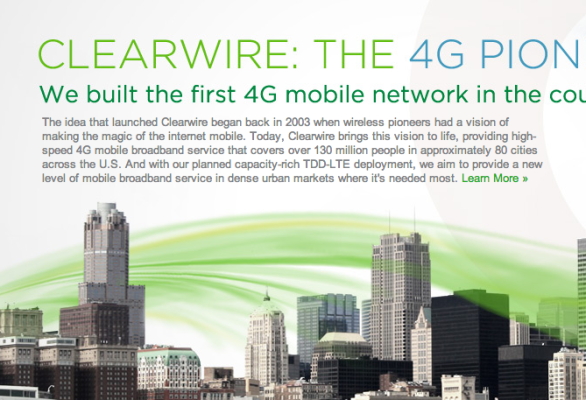Earlier, it was rumored that Sprint was considering a buy-out of the remaining 48 percent of Clearwire shares it didn’t own, after the pending SoftBank investment in Sprint promised to deliver it enough cash to negate the adverse effect of taking on Clearwire’s money-losing financials. Now, Bloomberg reports that Sprint is indeed looking to buy, in a deal worth about $2.1 billion according to the carrier.
Sprint wants to pick up the remaining 51.7 percent of Clearwire at a rate of about $2.90 per share, which represents a 5.5 increase on Clearwire’s closing stock price Wednesday. The carrier would also provide interim financing of $800 million, according to a regulatory filing made by Sprint today. Sprint and Clearwire formed a joint venture in 2008, bringing in stock ownership investments from a number of large companies including Comcast, TWC, Bright House Networks, Google and Intel. Sprint is a customer of Clearwire’s 4G WiMAX network, which actually ranks as the first largest wireless provider in the U.S. Clearwire has 11 million total subscribers, though the majority of those are not direct customers, instead using the network via Clearwire customers like Cricket, Sprint, and MNVO upstarts like FreedomPop.
Clearwire hasn’t performed up to its original expectations, and its Q3 financials included a widened loss at $213.8 million, along with spending cuts to help it narrow its loss outlook going forward. The $2.1 billion deal filed for today would require that SoftBank’s acquisition of 70 percent of Sprint go through in order to be successful.
For Sprint, acquiring Clearwire would provide a way for it to boost its network in key, densely populated and high-traffic urban areas where it will need capacity most, as it builds out its own LTE network to go head-to-head with Verizon and AT&T. That would require that it offers phones that support both its own LTE network, and Clearwire’s TD-LTE one. It’s not an ideal situation, but it’s still favorable to being left in the dust of AT&T and Verizon, for both networks.
